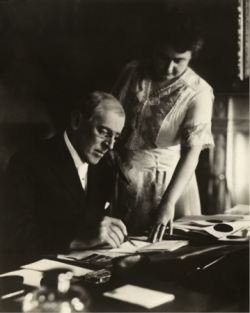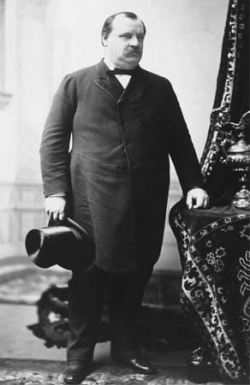
America’s Least Healthy Presidents
- Find out which important organ had major health impacts on three of America’s unhealthiest presidents
- Did one of our presidents seal his fate with jelly beans?
- Find out how to be healthier than our former leaders with these easy tips.
Dear Reader,
Happy Presidents Day!
In celebration of the holiday, today’s edition of Living Well Daily is going to take a little trek through time to look at the health of a few American presidents.
We will also reveal who takes the title of America’s Most Unhealthy President and what factors attributed to it.
Being the commander in chief of one of the most powerful nations in the world isn’t a cakewalk. Needless to say, it’s the kind of job that will take a toll on your health.
And as you we see, there is one organ that plays a vital role in the health of our former leaders. I will explain more later.
Let’s move on to some presidential health stats real quick…
Of America’s 44 presidents, eight have died while in office. Four of these were due to assassination, and four were due to natural causes.1
So it seems if you’re a president destined to die in office, there is a 50/50 chance you will die by violence or of health issues. Either way, it doesn’t look good. But eight of 44 isn’t exactly an astonishing number.
However, it’s when you take a deeper look at the personal health profiles of a few of these leaders that things get a little more interesting.
Before we dive into that, let’s take a closer look at the health issues of three of our presidents who didn’t die in office.
![]() Presidential Problems
Presidential Problems
Ronald Reagan, the 40th president (1981–89), suffered from many health ailments over the course of his life, including a bullet wound he received in 1981 during an assassination attempt. While President Reagan survived a bullet to the chest, he had worse health problems to deal with, including colon and skin cancers, prostate stones, and, lastly, Alzheimer’s disease.

Ronald Reagan handing a jar of jelly beans to Bill Clinton. Maybe Clinton ate them with his McDonald’s Big Macs?
Photo credit: msnbc.com
Known for an almost photographic memory during his time in office, Reagan’s memory went downhill during his 70s. At times, his memory would fail so badly he would forget the names of foreign dignitaries and even familiar staff members.2
President Reagan was also famous for his sweet tooth. In fact, 3.5 tons of Jelly Belly jelly beans were delivered for inaugural celebrations at the White House. Jelly Belly even created their Blueberry flavor for the event.3
Since research indicates high added sugar intake can increase your risk of cardiac disease, it would make sense that Reagan’s jelly bean habit may have attributed to his overall bad heath.4
As we have pointed out in a previous article, cardiovascular health is vital to maintaining brain health and staving off memory disorders.
Reagan died from pneumonia in 2004 at the age of 93 after a decade-long battle with Alzheimer’s.5
Next up on the unhealthy list is the 28th president (1913–1921), Woodrow Wilson. While Wilson is not quite the leader of the pack, his health was worse than President Reagan’s, for the most part.
Wilson experienced headaches, high blood pressure, and double vision during his adulthood. These symptoms may have been the precursor for the series of strokes Wilson suffered. These strokes started in 1896. In 1906, one of these strokes left him blind in his left eye.
However, in 1919, he suffered an immense stroke that left him paralyzed on his left side, forcing him to use a wheelchair and later a cane. In order to keep his reputation intact, Wilson kept his medical condition out of public view until 1920.

Woodrow Wilson getting help from his second wife, Edith, after his stroke.
Photo Credit: Library of Congress
In fact, his condition had deteriorated so greatly that it’s thought that his second wife, Edith, had to make all presidential judgments for him during his last three years in office.
Wilson’s bad health eventually became public knowledge and eventually led the ratification of the 25th Amendment. This amendment clarifies the vice president’s power in the event the president dies or becomes incapacitated. 2
Wilson died on Feb. 3, 1924, just three years after he left office.
The unhealthiest United States president was… (drumroll, please)
Grover Cleveland! Cleveland was both the 22nd (1885–89) and 24th presidents (1893–97) of the United States.
So what sets Cleveland apart? His appetite for rich foods, cigars, and heavy drinking, mostly.
Since his childhood, Cleveland suffered from obesity. Unfortunately, his extra weight followed him into adulthood. He was the second-heaviest U.S. president, weighing in over 250 pounds, surpassed only by William Taft, who tipped the scales at 300 pounds. In fact, Cleveland was so large his nephews and nieces referred to him as “Uncle Jumbo.”2

Grover Cleveland.
Photo Credit: britannica.com
Cleveland often indulged in beer and heavy foods. His love for beer was so strong, he had a very difficult time restricting his intake to four beers a day during a challenge with his rival in a district attorney race. He quickly decided that it was too strict for him to follow.
Cleveland also enjoyed cigars. After several years of smoking, an ulcer formed on the roof of Cleveland’s mouth that turned out to be a cancer. In a secret surgery, the former president had parts of his hard palate and upper left jaw removed. The surgery permanently disfigured Cleveland’s face.2
While Cleveland had a lot of chips stacked against him at the health table, it was his gout that became his worst affliction. Gout is a type of arthritis caused by high levels of uric acid. Gout is debilitating and severely restrictive for most sufferers.
But severe pain is not the worst possible health outcome for those with gout. According to research done by scientists at the University of Oxford, gout is now a marker for cardiac disease. In fact, having gout doubles your risk of having a heart attack or stroke.6
In Cleveland’s case, this risk may have been too much for him to evade — he died from a heart attack on June 24, 1908.7
As you can see, poor heart health is the common thread amongst these unhealthy presidents — Reagan’s Alzheimer’s, Wilson’s strokes, and Cleveland’s gout.
Diet, regular exercise, and reducing stress are the building blocks of heart health, but as you can see from the presidential examples, sometimes you may need a little extra help.
A supplement that helps to support cardiovascular health is olive leaf extract. In fact, a double-blind, randomized, parallel, and active-controlled human clinical study showed that people taking olive leaf extract experienced healthier blood pressure in just eight weeks!8
If you choose to make olive leaf extract a part of your health, be sure to check with your physician before taking it.
If you have any heart-healthy hacks you would like to share, write me! nmoore@lfb.org
Live well,

Natalie Moore
Managing editor, Living Well Daily
Sources
[1] List of U.S. Presidents Who Died In Office
[2] America’s 10 Unhealthiest Presidents
[3] Remembering President Ronald Reagan
[4] Added Sugars Add to Your Risk of Dying from Heart Disease
[5] Health and Medical History of President Ronald Reagan
[6] Risk of heart attack and stroke doubles for patients with gout
[7] Grover Cleveland Biography
[9] Pineapple, Bromelain and Gout: What is bromelain exactly and how does it help with my gout?
Written By Natalie Moore
Natalie Moore is a dedicated health researcher with a passion for finding healthy, natural, and science-based solutions. After a decade of direct healthcare experience in western and natural medicine, she was involved in public health research before joining Living Well Daily.
View More Free Articles
The Secret Ingredient to a Longer, Happier Life
Let’s face it. We’re all in need of an attitude adjustment from time to time. After all, when you turn on the news these days, the world can seem pretty dark. That is unless you make it a practice to look for the silver linings. In fact, Harvard researchers say when you do, something quite...
Do You REALLY Need All Those Skincare Products?
I often get questions about skincare products—and here’s what I’ve learned. In today’s beauty-obsessed world, it’s easy to fall into the trap of spending hundreds every month believing you need countless products to fight aging and achieve healthy, glowing skin. However, many dermatologists argue that LESS is MORE when it comes to skincare. Simplifying your...
“Ebb and Flow” Technique TRANSFORMS Senior Brain Health
You know by now that exercise is good for you. It keeps your heart healthy, your muscles strong, and your waistline trim. But what if I told you that a trendy “ebb and flow” workout technique—often associated with young fitness enthusiasts—could actually be a game-changer for us “oldsters” when it comes to brain health? And...
Mailbag: Slash Your Risk of Bone Fractures as You Age
“My doctor recently told me that I have osteoporosis. What can I do to reduce my risk of fractures and maintain strong bones as I age?” – Margaret Hi Margaret, Sorry to hear about your diagnosis. I’m sure it was a shock. Osteoporosis is a serious condition that affects millions of people, and it’s not...
Household Favorite EXPOSED as Cancer Risk?
We all want to believe that the products we use daily are safe. After all, if they weren’t, they wouldn’t be on store shelves, right? Well, I hate to break it to you, but sometimes, the truth is far more alarming than we’d like to admit. The World Health Organization (WHO) has just dropped a...
Hidden Heatwave Threat REVEALED
Heat waves can have serious consequences. After all, staying cool isn’t just a comfort issue. When the mercury soars, it threatens your health—especially when you’re a senior. There are various reasons for this, including chronic medical conditions and bodies that just don’t regulate temperature as well as they once did. But there’s another heat-linked threat...
The Hidden Threat Behind Your Achy Joints
Picture this… You’re trying to enjoy a leisurely stroll in the park, but each step sends a jolt of pain through your knee. Or maybe you’re attempting to open a stubborn jar lid, only to have your fingers refuse to cooperate, leaving you feeling frustrated and helpless. Perhaps you’re simply trying to get out of...
Parkinson's Signs You Can't Afford to Miss
Imagine waking up one day to find your body betraying you. Your hands tremble as you try to button your shirt. Your feet shuffle when you want to walk with purpose. Once strong and clear, your voice now barely reaches above a whisper. This is the reality for those living with Parkinson’s. But what if...
Do Protein Needs Drop with Age? The SURPRISING Answer
I had a patient ask me the other day if they needed as much protein now as when they were younger. After all, we aren’t quite as active as seniors compared to when we were spring chickens. It’s a good question. And the answer might surprise you… Remember when you could devour a whole pizza...
Follow Your “Gut Feeling” to Reduce Diabetes Risk
It seems like every day we learn something new about the incredible influence our gut has on our overall health. From mood to immunity, and even to how well we sleep, the community of microbes in our digestive tract is pulling the strings behind the scenes. So, it should come as no surprise that researchers...









